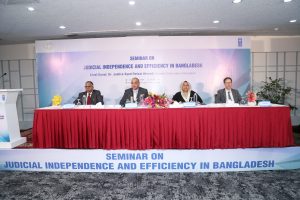
Staff Reporter : Honorable Chair, Mr. Justice Md. Ashfaqul Islam, Resident Representative of UNDP Bangladesh, Mr. Stefan Liller, Distinguished Judges of the Supreme Court of Bangladesh, Members of District Judiciary Members of Print and Electronic media Excellencies, Ladies and Gentlemen,

A very good morning to you all, As I address this esteemed gathering, I wish to start by sharing a scene that unfolded just a few days ago in our courtroom, a moment that encapsulates the essence of why we are here today.
During an urgent mention at the Appellate Division, a petitioner, anonymous, approached the bench. He spoke with a trembling voice, his words broken by tears. His plight was one of delayed justice—his promotion had been on hold since 2021 due to an unresolved appeal. With an elderly mother and two children in university relying on him, he found himself struggling to keep his household afloat.
Moved by his distress, I assured him that his case would be heard promptly in the upcoming month. His heartfelt gratitude reminded me—and, I believe, all of us—why judicial efficiency is not merely an administrative goal but a moral imperative.

This moment is emblematic of the broader challenges we face in ensuring that justice is not delayed, denied, or diminished in its impact.

Ladies and Gentlemen, allow me to begin by paying homage to the memory of the martyrs of 1971, whose sacrifices laid the foundation of our independent nation. This month of victory, December, serves as a powerful reminder of their unparalleled courage and dedication.
Let us also remember the resolute spirit of the student-led revolution of July and August 2024, which catalyzed the movement to oust oppression and restore justice, equality, and humanity. These defining moments in our history remind us that the quest for justice is not a fleeting endeavor but a lifelong commitment—a commitment that forms the bedrock of our judicial mission.
Distinguished presence,
When I had the distinct honor of taking the oath as the 25th Chief Justice of Bangladesh, I was acutely aware of the immense responsibility placed upon my shoulders. This role is not merely a position of leadership but a solemn trust bestowed by the people of this nation to uphold fairness, equity, and ensure access to justice for all, irrespective of their status or circumstances.
From the very moment of my appointment, I recognized the urgency of addressing the challenges that have long impeded the full realization of our judiciary’s potential. To this end, on September 21, I unveiled a comprehensive Roadmap for Judicial Reform. This initiative is a cornerstone of my vision to strengthen our judiciary and its capacity to serve the people with integrity and efficiency.
Dear colleagues,
As part of my steadfast commitment to institutional reform and strengthening the independence of the judiciary, I have taken decisive steps to establish the foundations for true separation of powers. I have declared and initiated the process of creating a separate Secretariat for the Judiciary, a pivotal measure to ensure the judiciary’s administrative autonomy. Alongside this,
I have proposed the formation of a Judicial Appointment Council to institutionalize transparency and meritocracy in the appointment process of apex court judges, as well as Posting and Transfer Guidelines for District Judiciaries, aimed at fostering consistency and fairness in judicial postings. These proposals have been formally submitted to the government for necessary action, marking a significant step toward the complete institutional separation of the judiciary from the executive branch.
Moreover, in reinforcing the judiciary’s independence from the legislative branch, we have restored and strengthened the Supreme Judicial Council following the disposal of the 16th Amendment review case. This pivotal move effectively eliminates the provision for Parliament to impeach Supreme Court judges, ensuring that the judiciary remains free from undue political influence. These measures collectively embody a holistic vision for safeguarding the independence and integrity of our judicial system, reflecting our firm commitment to uphold the principles of justice and the rule of law.
Another important initiative I would like to share is recognizing the critical importance of access to justice, I introduced a Capacity Test alongside the existing Means Test for invoking legal aid services. This reform was driven by the alarming reality that a significant number of individuals were being denied defense counsel in court, undermining their fundamental right to a fair trial.
The Capacity Test assesses an individual’s ability to navigate legal proceedings independently, ensuring that those who lack resources are provided with the support they need. This initiative marks a significant step forward in our reform efforts, as it expands the reach of legal aid services and reinforces our commitment to ensuring that no one is denied justice due to financial or practical constraints.
Meanwhile, upon my assuming office, I forthwith instructed my registry to diligently adhere to 12-point directives, which, though not exhaustive, encompasses paramount priorities: the maintenance of an unblemished code of conduct, the eradication of monetary corruption, the provision of swift and seamless services to seekers, and the assurance of a hassle-free experience for all. Furthermore, I directed the establishment of a helpline to facilitate citizens’ unimpeded access to the system, thereby ensuring transparency and efficiency. These objectives collectively form the cornerstone of my envisioned roadmap, blending persistent principles with modern exigencies for the greater good of society.
Distinguished participants,
Judicial independence must be complemented by efficiency. A justice system that is delayed or inaccessible is a justice system denied. We are keenly aware of the challenges posed by case backlogs, delays, and procedural inefficiencies. Addressing these challenges requires a multi-faceted approach, one that combines innovation, diligence, and foresight.
To that end, we are working to streamline case management processes, harnessing technology to make court operations more efficient and transparent. Digitalization is no longer a luxury; it is a necessity. By integrating modern tools and technologies, we aim to reduce delays, enhance transparency, and provide litigants with a more seamless experience.
To achieve these transformative initiatives, the support of our development partners is indispensable. The technical expertise and resources they bring to the table are crucial in turning our vision for an independent, efficient, and people-centric judiciary into reality. In this regard, the UNDP can play a pivotal role as a catalyst, facilitating capacity-building programs,
technological advancements, and policy development tailored to the judiciary’s unique needs. By fostering collaboration, offering innovative solutions, and ensuring sustainable implementation, our development partners, with UNDP at the forefront, can empower us to overcome challenges and build a justice system that stands as a beacon of fairness, accessibility, and efficiency for all.
Strategic Collaboration with Development Partners : However, for any future and feasible strategic partnership with our development partners, coordination and sustainability emerge as key components. Past experiences dictate that meaningful cooperation requires partners, acting both individually and as part of a larger consortium, to align their innovations with other stakeholders on the ground. This ensures the avoidance of ad-hoc and disoriented interventions in capacity-building efforts, which often remain as isolated chapters of empowerment, failing to contribute to overall institutional growth.
Therefore, we advocate for inter-partner strategic planning before proposing any developmental initiative to the judiciary. Such an approach is essential to ensure that interventions are not piecemeal but are sustainable and integrative, addressing the judiciary’s long-term goals and reinforcing its operational and institutional frameworks.
Building a People-Centric Judiciary
At the heart of all our efforts lies a singular objective: to create a judiciary that serves the people. Justice must not be confined to the courtrooms of major cities; it must reach every corner of the nation. To achieve this, we are committed to extending legal aid services, enhancing capacity tests, and ensuring that justice is accessible to all, irrespective of socio-economic barriers.
I believe that a people-centric judiciary is one that not only adjudicates but also empowers. It educates citizens about their rights, provides them with accessible services, and builds trust through transparency and fairness. This vision is what drives us every day, and it is what will define the judiciary of the future.
A Collective Effort : None of these initiatives would be possible without the tireless efforts of my team. Their dedication, innovation, and commitment are the driving forces behind our progress. I am profoundly grateful to them and to all those who have contributed to this journey. Their relentless pursuit of excellence inspires confidence that the goals we have set will not remain aspirations but will become tangible realities.
Conclusion : Ladies and gentlemen, as we conclude, let us reflect once more on the profound responsibility we bear as custodians of justice. Stories like that of anonymous are not isolated incidents—they are the lived realities of countless individuals across our nation. They remind us that justice is not an abstract principle; it is a lifeline for the vulnerable, a shield for the oppressed, and a example of hope for all.
Judicial independence and efficiency are the twin pillars that sustain this lifeline. Independence ensures that justice is free from undue influence, and efficiency ensures that it is timely and accessible. Together, they form the foundation of a judiciary that is not only fair but also trusted by the people it serves.
As Alexander Hamilton famously stated in The Federalist Papers, “The judiciary, from the nature of its functions, will always be the least dangerous to the political rights of the Constitution, because it will be least in a capacity to annoy or injure them.” This underscores the judiciary’s critical role as the ultimate guardian of the rule of law, unencumbered by external pressures. Hamilton’s depiction of the judiciary as the “least dangerous” branch highlights its limited power compared to the executive and legislature, focusing on its role as a guardian of constitutional rights. However, its independence, ensured by life tenure and salary protections, and its power of judicial review make it a pivotal check on government actions, ensuring adherence to the Constitution.
The importance of efficiency is aptly captured by the words of Lord Hewart, the former Lord Chief Justice of England: “Justice delayed is justice denied.” These words echo deeply in our context, where case backlogs and procedural delays threaten to erode public trust in the system. It is our duty to ensure that justice is swift without sacrificing its integrity.
As we advance our reforms, let us draw inspiration from these ideals. Our efforts must be underpinned by the belief that a judiciary should not only resolve disputes but also uphold the principles of fairness, equality, and dignity.
A Vision for the Future : I envision a judiciary that operates as a model of accountability, where every litigant, regardless of their status or circumstances, feels assured that their case will be heard and resolved impartially. I envision a judiciary that bridges the gap between the legal system and the people it serves, making justice more accessible through technology, legal aid, and procedural reforms.
But this vision is not mine alone—it is a shared aspiration, one that requires the collective commitment of all stakeholders. As the American jurist Benjamin N. Cardozo observed, “The great tides and currents which engulf the rest of men do not turn aside in their course and pass the judges by.” We, too, must adapt, innovate, and remain steadfast in our pursuit of justice.
As we move forward, let us remember that the judiciary’s strength lies not in its grandeur but in its humility. It is our ability to listen, to empathize, and to act decisively that defines us. Let us work together to ensure that justice is not only done but is seen to be done, as Lord Denning so eloquently emphasized: “Justice must be rooted in confidence, and confidence is destroyed when right-minded people go away thinking: the judge was biased.”
Today, I call upon every member of this esteemed gathering- judges, and our development partners to reaffirm your commitment to the ideals of justice. Let us strengthen the independence of our judiciary, enhance its efficiency, and, most importantly, place people at the heart of our mission.
Ladies and gentlemen, let us move forward with determination, for the pursuit of justice is a journey worth taking—a journey that honors the sacrifices of the past, addresses the needs of the present, and secures the promise of the future. Thank you for your time, your attention,

